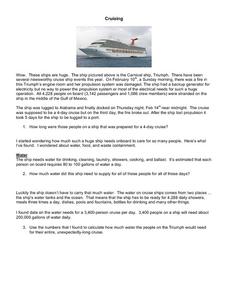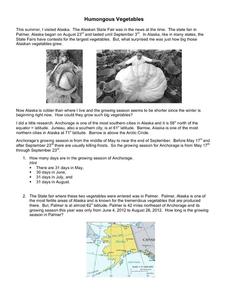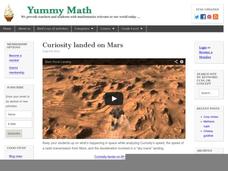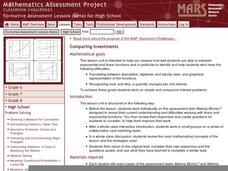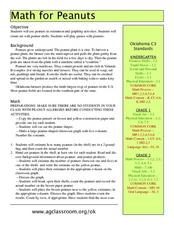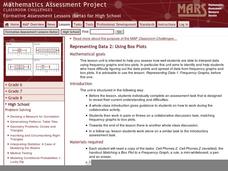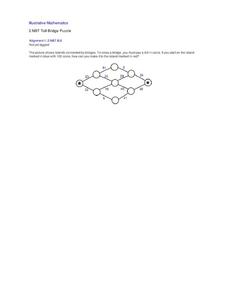Illustrative Mathematics
Lake Algae
Introduce learners to exponential growth with this real-world problem about algae that is rapidly spreading across a lake in a city park. The task presents the rate of growth and an end value and asks learners to determine what happened...
Curated OER
Cruising
Cruise ships offer many engaging opportunities for real-world math adventures. These large, floating cities use resources with numbers into the thousands place. Young mathematicians are asked to calculate numerical information relevant...
Curated OER
Extending the Definitions of Exponents, Variation 2
Introduce the concept of exponential functions with an activity that extends the definition of exponents to include rational values. Start with a doubling function at integer values of time, then expand table to include frational time...
Curated OER
Alex, Mel, and Chelsea Play a Game
This short probability question may look simple at first, but it is actually quite complex! Learners must understand independent events in context and must take into account several different scenarios. Use as an individual assignment...
Curated OER
The Titanic 3
Can survival rates on the Titanic be explained by the "women and children first" policy or did rescue procedures favor the wealthy? Use actual historical data to explore conditional probability and independent events with your class....
Illustrative Mathematics
How Many Colored Pencils?
Support young mathematicians' interpretation of place value in order to multiply single-digit numbers by 10. The task builds upon and enhances a learners' understanding of place value, a second grade skill, while introducing them to...
Curated OER
Carnival Tickets
A great subtraction and division discovery opportunity for young mathematicians, this learning task involves seven word problems that require multiple steps. Learners use a math table to persevere in solving problems that are supported...
Curated OER
Humongous Vegetables
Humongous vegetables can inspire and awaken your mathematicians to the large math concepts in our Common Core standards. What is the secret to growing such gargantuan garden objects in Alaska? In the state that is closest to the North...
Yummy Math
Curiosity Landed on Mars
Out of this world math and science are mixed together on a worksheet that would be a great enrichment activity classrooms that are studying our solar system. The information presented is best suited toward middle school math, and...
Curated OER
Comparing Investments
Money, money, money. A complete lesson that makes use of different representations of simple and compound interest, including written scenarios, tables, graphs, and equations to highlight similarities and differences between linear and...
Illustrative Mathematics
Running a Mile
The single question in this activity has multiple ways to be solved. Two boys ran a mile. Their times were similar, except one time was a fraction of the other. Who ran faster? In demonstrating the answer to this problem, upper graders...
Curated OER
Sitting across from Each Other
What is the probability that two randomly seated people will be across from each other at a square table? Check learners' understanding of theoretical probability and compound events with this short assessment. A great opportunity to...
Illustrative Mathematics
Medieval Archer
This activity presents a problem about a computer game which uses functions to simulate the path of an arrow fired by an archer. Learners use the given function to determine where the archer must stand in order to fire an arrow that will...
Illustrative Mathematics
Temperatures in degrees Fahrenheit and Celsius
Learners investigate the relationship between the Fahrenheit and Celsius temperature scales. Given two data points, they construct a linear function to describe the relationship, find the inverse of the function, and make observations...
Curated OER
As the Wheel Turns
This is not your typical Ferris wheel problem. In this exercise, your class will combine their knowledge of sinusoidal functions as well as linear motion to come up with parametric equations that model the position of a point on the edge...
Oklahoma State University
Math for Peanuts
Peanuts! Get your peanuts! Kids explore math, art, and agriculture concepts focused on peanuts. There is a brief informational text to get them started, and you'll find definitions of five in-text vocabulary words to address. Kids...
Curated OER
Representing Data 2: Using Box Plots
What information can be gleaned from a box and whiskers plot? Discuss the five summary values - minimum, maximum, upper and lower quartiles, and median - and what conclusions can be made from these values? Included here is a matching...
Curated OER
Representing Data 1: Using Frequency Graphs
Here is a lesson that focuses on the use of frequency graphs to identify a range of measures and makes sense of data in a real-world context as well as constructing frequency graphs given information about the mean, median, and range of...
Illustrative Mathematics
Toll Bridge Puzzle
Here is a great problem-solving activity for young mathematicians. Intended solely for instructional purposes, the activity is appropriate for learners to add four numbers together. Not only must they add four numbers together,...
Illustrative Mathematics
Building toward fluency
Here is a great learning task that focuses on the development of areas in computational fluency including strategies in mental math. Young learners are guided through a list of addition expressions that help them visually understand the...
Illustrative Mathematics
Traffic Jam
How many cars would be involved in a traffic jam 12 miles long? A slightly ambiguous writing prompt gives learners the opportunity to practice making reasonable assumptions to tackle a real-life problem. Few details are given, so they...
Illustrative Mathematics
Harvesting the Fields
This problem involving rates may look simple at first, but it is actually quite challenging. Two different sized fields are harvested by a team of workers and learners must use different rates to calculate the number of workers on the...
Illustrative Mathematics
Invertible or Not?
What determines whether a function has an inverse? Learners investigate that criteria when they examine values in a partially completed input-output table for two different functions. The task is to complete the table so that one of the...
DK Publishing
Taking 2 Away
Go deep and dive under the sea with subtraction! Kindergartners practice taking two away from different groups of fish and writing in the answer. Have them color the fish for extra fun after they finish their math work.



